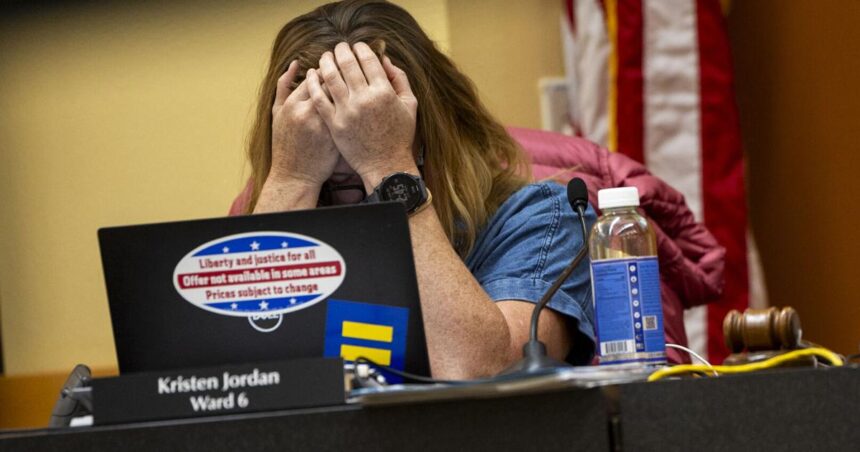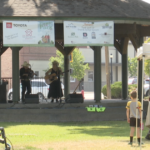Missoula’s City Council approved new urban camping laws that establish buffer zones around homes, schools, and businesses, as well as rules for living in vehicles around town.
The councilors voted 10-2 to implement the new policies. Councilors Daniel Carlino and Kristen Jordan voted in opposition. According to state guidelines, the new laws will take effect in 30 days, or on July 25.
The meeting commenced on Monday evening and lasted until 3:30 a.m. Tuesday morning.
Missoula Mayor Andrea Davis and councilors Amber Sherrill, Mirtha Becerra, Gwen Jones, Mike Nugent, Stacie Anderson, Bob Campbell, and Sandra Vasecka supported the resolution.
“I recognize that this is an extremely controversial issue for many people across the spectrum,” said Davis at the beginning of the discussion. “No one city has mastered this, so we are trying to manage this to the best of our ability with compassion and accountability.”
People are also reading…
The new laws mandate homeless individuals to camp at least 100 feet away from homes and businesses, and 300 feet away from shelters and schools.
Additionally, there is a 50-foot buffer zone around the city’s rivers and creeks, a 10-foot buffer from trails, and a 100-foot buffer from most park features like sport courts or splash pads.
Camping in Caras Park, McCormick Park, Westside Park, Rail Link Park, and Jacob’s Island Dog Park is prohibited. Camping on conservation lands is also not allowed.
The regulations require individuals sleeping outside to dismantle their camp between 8 a.m. and 8 p.m. daily. Failure to comply with the laws could result in a civil infraction and a $25 fine.
The approval of the new laws in the early hours of Tuesday also involves the implementation of a vehicle permit system for people residing in their cars or trailers. The program permits individuals to stay in one location for up to 90 days, provided they do not violate any city policies related to health or safety.
Furthermore, the law directs the mayor’s office to enhance trash, bathroom, and needle pickup services in areas where overnight sleeping is permitted. The mayor’s office will also explore the possibility of establishing an authorized city campsite.
Although most council members were in favor of the new laws, the majority of public speakers opposed them. Many individuals called for the city to establish a designated camping area, while others raised concerns about the legality and long-term implications of the laws.
“We do not know the ultimate cost that will come with this, and we would like to see this not pass,” remarked William Knight, the litigation director for the National Homeless Law Center, during the public comment session. “This relies entirely on the goodwill of this administration with no consideration for whether future administrations will show the same level of compassion.”
Last-minute tweaks
The council approved several amendments to the urban camping laws on Tuesday, including the requirement for an annual review of the city’s policies and the establishment of a safe space for homeless individuals with mobility issues by the mayor’s office.
The annual review was approved without objection. Davis mentioned during the meeting that the review could be conducted in January 2025, considering the new laws as “iterative” and subject to adjustments over time.
Another amendment mandated the mayor’s office to create a designated camping site for individuals with health and mobility concerns.
Ward 2 Councilor Sierra Farmer also modified the laws to require the city to produce a map of all campsites to be distributed to the community in paper or electronic form before the rules become effective on July 25.
City Parks and Recreation Director Donna Gaukler mentioned that her department is working on creating such maps, but it will take time as they identify suitable locations for camping in each park.
“The challenge at this point is mapping out each buffer in each section of city land, and in addition to creating maps, we plan to provide educational materials along with it,” Gaukler explained.
“As we determine our irrigation and maintenance needs in certain parks, we may need to rotate through parks to accommodate these camping sites,” added Davis.
A comprehensive map illustrating potential designated camping areas created by a professor at the University of Montana was showcased during public comments at the meeting. However, city staff stated that they had not received a copy of the map, and the provided map lacked sufficient detail for use.
Additional amendments, put forth by Councilors Carlino and Jordan, will restrict the city’s capacity to impound vehicles and will necessitate more notice before camp clearances.
Significant opposition to time restrictions
Attempts to remove the 8 a.m.-to-8 p.m. camping restriction and cancel camp clearances in inclement weather were unsuccessful.
While only three councilors voted to eliminate the time restrictions, numerous individuals from Missoula, including most homeless service providers, expressed disapproval for the rule.
In a letter addressed to the City Council, Missoula’s service providers objected to forcing individuals to dismantle their camps and relocate during the day, requesting the City Council to reconsider the final law. The letter was signed by the leadership of various organizations, including the Poverello Center, Hope Rescue Mission, Missoula YWCA, Partnership Health Center, Open Aid Alliance, Missoula Food Bank and Community Center, and the Missoula Public Library.
“The ‘8-8 rule’ impedes their ability to seek employment, attend medical appointments, and access basic amenities,” the letter stated. “Carrying all their belongings throughout the day not only stigmatizes them but also restricts their access to facilities that prohibit large bags, such as convenience stores.”
Several public speakers also objected to the time restrictions, with over 50 individuals voicing their concerns at the meeting. Many of them advocated for the elimination of the 8 a.m. to 8 p.m. rule.
Knight, from the National Homelessness Law Center, mentioned that singling out homeless individuals to move during the day could potentially violate their rights.
“This law exposes you to additional risks and legal challenges under the Americans with Disabilities Act, as well as constitutional theories,” Knight warned, concluding, “This is not an equitable measure; it is a harsh punishment and categorical discrimination against your most vulnerable neighbors.”
The council discussed the possibility of moving individuals on a 24-hour basis, but Gaukler cautioned that a 24-hour rule could lead to confusion and clash with the daily operations of parks.
“If the council wishes to extend the hours, we may need more flexibility in terms of location, or have certain sites with extended hours,” suggested Gaukler.
Over the next month, the city will work on developing maps and educational materials before commencing the enforcement of the homeless camping regulations.
Griffen Smith is the local government reporter for the Missoulian.





